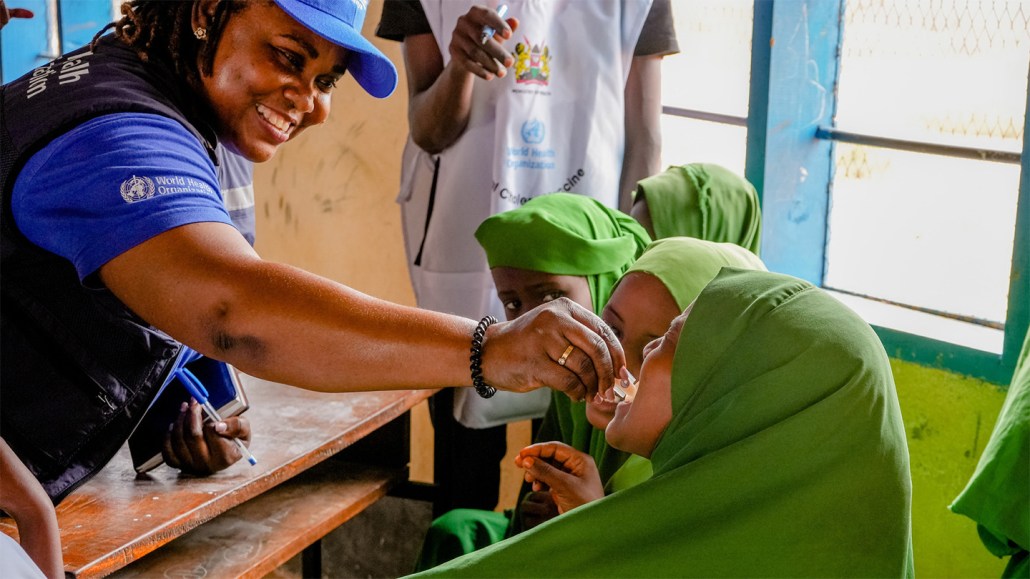Trump is withdrawing the U.S. from WHO. Here’s what that means
Gutted funding and lack of participation could limit U.S. access to crucial disease data

In 2023, WHO staff worked with Kenya’s ministry of health and other partners to vaccinate some 2 million people against cholera. The organization works with countries around the world to prevent infectious disease.
Billy Miaron/WHO
For the second time, President Donald Trump has announced plans to pull the plug on U.S. support for the World Health Organization. The global health and humanitarian organization works to eradicate disease and track outbreaks, which often ignore international borders.
On January 20, Trump signed an executive order stating the United States’ intent to withdraw from the Switzerland-based organization, a process that takes 12 months. His first attempt to exit the WHO in July 2020 was thwarted by President Joe Biden, who took office in 2021 and reversed the decision.
The United States helped found WHO in 1948. “For over seven decades, WHO and the USA have saved countless lives,” the organization said in a statement. “Together, we ended smallpox, and together we have brought polio to the brink of eradication.”
Currently WHO’s top donor, the United States contributed about $1.25 billion in 2022–2023. Germany, the second largest donor, contributed $856 million over the same period. Trump cited the United States’ “unfairly onerous” financial contribution as a reason for withdrawing from the organization. He also criticized the organization’s leadership during the COVID-19 pandemic.
Though withdrawal will cut this one expense, the action may come at great cost, experts warn. It will leave “WHO weaker and the U.S. isolated when global health challenges demand unity,” a group of health policy experts wrote January 21 in the BMJ. The action also “severely diminishes American influence and standing in the world,” they write.
To learn more about the implications of withdrawing from WHO, Science News spoke with Paul Spiegel, director of the Johns Hopkins Center for Humanitarian Health. The interview has been edited for length and clarity.
SN: What does the World Health Organization do?
Spiegel: WHO sets global health standards. It develops international health regulations where governments all across the world report certain diseases, including diseases with epidemic potential. It acts as an early warning system for infectious diseases and provides global surveillance and sharing of data. The U.S. benefits from WHO getting data from different countries.
WHO also provides vaccinations, as well as guidance to governments on noncommunicable diseases — everything from tobacco control to cancer screening to work with diabetes. It’s a source of technical know-how for many countries around the world.
And then finally, WHO helps many countries during humanitarian emergencies.
SN: What will the United States’ withdrawal do to WHO?
Spiegel: The United States is the largest funder by a long shot, and it’s unlikely that other countries will be able to [make up the difference]. That’s going to have a major effect on WHO. They will have no choice but to either close down offices or let people go.
SN: Who will these changes impact most?
Spiegel: Certainly, some of the poorest countries in the world. So, many countries in Africa, some countries in the Middle East. WHO is going to have to make some very difficult decisions. They’re going to need to look at their budget and say where they’re going to cut.
In Ukraine and Sudan, in Gaza, and Myanmar, WHO is helping coordinate the health response to humanitarian emergencies. It’s very, very expensive. I imagine that’s one of the areas that are going to be cut because of the amount of money that’s involved. That would have a very negative effect on probably hundreds of millions of people affected by conflict and humanitarian emergencies.
SN: How could withdrawal affect people in the United States?
Spiegel: I don’t see any benefit for the U.S. withdrawing. It ultimately makes Americans less secure, from a public health perspective.
As a country, we rely on WHO work, particularly because the [U.S. Centers for Disease Control and Prevention] works so closely with them on global health security. Withdrawing from WHO puts America in a more precarious position, particularly for infectious diseases.
WHO’s disease surveillance will be reduced; there will be less information coming out of WHO, and it’s unclear if WHO and the CDC will coordinate like they were doing before.
SN: Do you see foresee withdrawal affecting U.S. science and science policy?
Spiegel: Yes. In many studies, WHO has facilitated U.S. work with different ministries of health. WHO has the respect of most of the ministries of health around the world and can help with networking and coordinating research.
[Withdrawing from WHO] could negatively affect the research that we do in the U.S.
And at the World Health Assembly [WHO’s annual meeting], the United States is very involved in many, many, many, many decisions from vaccine procurement to diplomacy. By withdrawing, the U.S. will not only no longer be involved in those discussions but will also leave behind a leadership vacuum. Other countries, like China, will certainly try to step in.







